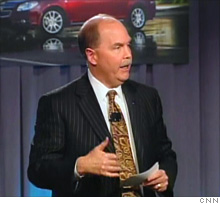New GM, old faces
Fritz Henderson has been CEO of GM for three months, but some question whether the GM-lifer can make needed changes in its management culture.
 |
| GM CEO Fritz Henderson said he knows what needs to be done to shake up management at GM, but others aren't so sure. |
NEW YORK (CNNMoney.com) -- General Motors CEO Fritz Henderson has argued this week that a bankruptcy court needs to approve plans to create a new GM, one unburdened by many of the contracts and liabilities of the past.
But there are many auto industry experts who question whether Henderson, who has worked at GM ever since graduating from business school 25 years ago, is the right man to bring about a necessary change at the company.
Critics argue that if ever there was a company in need of shaking up the executive culture, it's GM (GMGMQ), long a land of fiefdoms that divided not just different brands but different business functions, such as purchasing and manufacturing.
Trying to get agreement between all those disparate parts has led to cumbersome decision making at GM, some maintain. That has turned GM into a company unable to respond quickly to changes in the market.
One former GM employee said the company's management culture needs an almost immediate overhaul if GM is to start producing the vehicles it needs to revive sales and return to profitability.
"The removal of managers and executives so far has been mainly at lower levels, thinning ranks and taking out layers," said Rob Kleinbaum, previously a GM market research and planning executive and now a managing director of consulting firm RAK & Co. "It's not replacing people who made the mess and created the culture."
GM's top rivals are now led by people who are not industry veterans. Ford Motor Co. (F, Fortune 500) went outside the auto industry to find CEO Alan Mulally, a top Boeing (BA, Fortune 500) executive before he was tapped to run Ford in 2006. Chrysler, which emerged from bankruptcy last month, is now being run by Fiat CEO Sergio Marchionne, who himself was new to the auto industry when he took over Fiat (FIATY) in 2004.
"Most successful turnarounds have been led by outsiders," said Kleinbaum, who recently completed a study with researchers from the University of Michigan on corporate turnarounds. "The fact that Fritz seems dedicated to keeping the management team in place makes me extremely uncomfortable."
Henderson is relatively new to his current job, being promoted to CEO in March when the Obama administration forced then GM CEO Rick Wagoner to resign.
But many in the industry saw that as a move to put in place a GM management less resistant to the idea of a bankruptcy filing, rather than shaking up the company altogether. With administration support, GM filed for bankruptcy June 1.
Not surprisingly, Henderson said he believes he's the right man to be making the changes that are necessary at GM.
"I know the company inside and out. I know the industry well," he told Fortune in a recent interview. "I think that does bring some experiences that can be very helpful in terms of change because I know what needs to be changed. That's my job to show I can do it."
But Henderson's critics say that the company would benefit greatly from an outsider's perspective as it attempts to start fresh following bankruptcy.
"You need some fresh blood in there," said Erich Merkle, an independent auto analyst and consultant. "The culture is not one that fosters speed, especially speed to market. It's a smaller company that still act like a large company."
Not all outside experts think Henderson is a bad fit for a new GM. David Cole, chairman of the Center for Automotive Research, said he believes Henderson is very different from traditional GM executives, partly due to his time spent overseas in GM's South American and European operations.
Cole said Henderson is a "high speed decision maker" who doesn't get enough credit for the changes in executive culture at GM already being put in place.
"The system at GM has been changing rapidly in the last few years," said Cole. "Observers have this picture that things haven't changed in 20 years. That's not the case."
Cole said the bankruptcy is forcing GM to already make dramatic changes, and that he believes bringing in an outsider at this crucial point in the company's history would be too risky.
"This business is far more complicated than most industries," he said. "The last thing you want is people making decisions with no foundation for those decisions."
Not all auto industry outsiders have worked out well. When Cerberus Capital Management bought Chrysler LLC in 2007, it installed former Home Depot (HD, Fortune 500) CEO Robert Nardelli, who did little to turnaround the company's fortunes.
But Kleinbaum said this is precisely the time a different perspective is most needed at GM. He said all of the company's problems can be traced to the company's management style.
"It's all about them being out of touch with customers, and being risk averse," Kleinbaum said. "And there has long been a complete lack of accountability. No one has been dismissed by poor performance except for Wagoner, and he was dismissed by the president." ![]()



